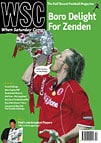 Newspaper rumours of a Manchester United bid for Steven Gerrard set Ashley Shaw thinking about just how rare transfers involving Liverpool have been in the modern era
Newspaper rumours of a Manchester United bid for Steven Gerrard set Ashley Shaw thinking about just how rare transfers involving Liverpool have been in the modern era
As transfer stories go, Steven Gerrard’s recently rumoured move to Old Trafford would seem about as likely as an Osama Bin Laden peace mission to Washington. But why should this be? If Manchester United and Liverpool were ordinary businesses and a key member of staff spotted an opportunity for lucrative promotion at a rival company, then there would be few bars to a “transfer”.
Yet for 40 years now a transfer embargo has existed between Manchester United and Liverpool – an illustration perhaps of the depth of feeling, perhaps dread, that can come with the sale of one of your own to a hated rival.
Of course, the cities of Manchester and Liverpool have been bitter rivals for centuries – the construction of the Manchester Ship Canal a particular thorn in relations. Yet since Liverpool’s £25,000 purchase of inside-forward Phil Chisnall from Old Trafford in April 1964, there has not been a direct transfer between the two clubs. Incidentally, Chisnall’s Anfield career never took off – he made just eight appearances before departing for Southend and was last heard of working at the Trafford Centre branch of Asda.
In four decades since, a few players (such as Paul Ince and Peter Beardsley) have gone between the northern giants via other, but otherwise the embargo has held – the prospect of selling a player directly apparently too much for either board to contemplate. Since 1945 only one other player (full-back Tommy McNulty – £7,000, United to Liverpool, February 1954) has gone between the two clubs. Yet before the war business between the clubs was brisk: in 1938 two wing-halves, Ted Savage in January and Allenby Chilton (later a stalwart of the 1948 FA Cup winners) in November, moved to Manchester from Anfield. Chilton is the last player to go from Liverpool to United.
The reason for this embargo is best explained by the Anfield connections of the man who sold Chisnall to his friend Bill Shankly 40 years ago this April. Matt Busby signed for Liverpool from Manchester City in March 1936 for £8,000 and, while never the most spectacular performer at Anfield, the Scottish wing-half proved a classy addition to a Liverpool team that otherwise struggled before the war. Busby, contrary to United legend, enjoyed his time under George Kay at Anfield and went to great lengths to sign Kop legend Billy Liddell during the war. Busby was happy on Merseyside and would probably have stayed on as a coach after the war had he not been made a better offer by United’s board.
The unlimited horizons provided by a club with no home ground, no training facilities and few prospects but offering total control over virtually everything connected with United was too great a lure to Busby. The chagrin felt by Liverpool directors and supporters as their former favourite reinvented football management must have been total – a state of affairs only lessened when Busby recommended his old pal Shankly to the Liverpool board in 1959.
Of course it was in the Busby/Shankly era that this rivalry took on a life of its own. The pair wove their personalities into the fabric of their respective clubs: for Busby the inspiration was youth, for Shankly ruthless determination. As a result the eventual trophy haul of the two pales into insignificance compared to the manner in which they transformed community institutions into football superpowers and, ironically in view of the pair’s close friendship, hated rivals.
Thus the continuing embargo, an impasse not helped by the pride felt by fans in both cities. I would wager that the area of the country with the lowest percentage of United fans is Merseyside and it is unlikely that their recent success will have altered this. Meanwhile, United’s frequent dealings with their closest geographical rivals at City supports the feeling that players and their families prefer to stay in the same area when a transfer beckons. That the trade continues despite the disastrous sale of Denis Law in the early 1970s offers weight to the argument that United no longer regard City as serious rivals.
Meanwhile the uneasy truce continues, despite Sir Alex Ferguson’s admiration for Gerrard in particular. Then again, the new financial climate in football might change all this: if Liverpool find themselves staring into a financial abyss and the loose-limbed midfielder doesn’t fancy a move to London, Italy or Spain he could break the barrier…
Oh, and Mr Bin Laden, George will see you now.
From WSC 206 April 2004. What was happening this month